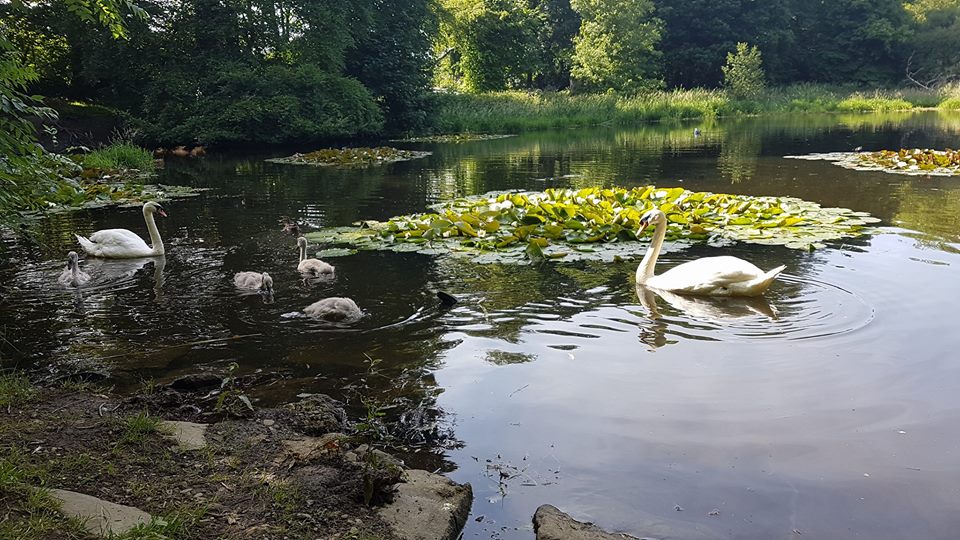News
Swan ‘killers’ in court


Swans: The family in Withybush Woods before the shootings (pic. The Herald)
THREE people accused of shooting four swans at Withybush Woods in October last year appeared before magistrates at Haverfordwest Law Court today (Mar 14).
There should have been four people in the dock, however Joseph Lawson, accused of jointly harming a swan with his co-defendants, did not attend court.
Magistrates issued a warrant without bail and hoped he would be brought to court immediately, before officers became aware that Lawson was in Mansfield.
The defendants who decided to show up to the hearing were: 32-year-old Gareth George Mattson of Goshawk Road in Haverfordwest; 24-year-old Benjamin Phillips of Jury Lane in Haverfordwest; and a 13-year-old boy, who cannot be named for legal reasons.
The 13-year-old boy and Phillips both pleaded guilty to the charges against them, however Mattson denied the allegation.
Prosecutor, Vaughan Pritchard-Jones, told the court that a problem with the swans was reported to Maria Evans of the Wildlife Trust. Ms Evans attended Withybush Woods on October 20, and could see a female adult swan was dead, but she was unable to recover it.
Mr Pritchard-Jones said: “The swan still hasn’t been recovered, and may still be there unless it has been taken away by a predator.”
He explained to the court that the following day, a cygnet had been found on the bank of the lake and was recovered. It was taken to All Pets Vet Care in Milford Haven for a veterinary examination.
At this point, it was still alive.
Mr Pritchard-Jones said: “It had received an injury to its wings. An x-ray taken of its wing showed fragments of an air pellet. The main bone had completely severed and was out of alignment. It had completely snapped.
“There were four or five metal fragments in its wing. It had to be put down, as it was unable to make a recovery.”
Three days later, a male swan was found dead in the same location. This bird was too taken to All Pets Vet Care, and underwent an X-Ray.
Mr Pritchard-Jones explained: “One pellet was in the middle of the abdomen, and one was near the joint of the leg by the hip joint.”
A fourth cygnet was recovered by the RSPCA the following day, which had damage to its wing consisting of a ‘soft tearing injury’.
Mr Pritchard-Jones told the court that there was no pellet found in that cygnet. However the wound ‘could’ have been made by a pellet passing through.
He went on to say that after police had made enquiries, suspicion fell on the four defendants. They made prepared statements, and the police and prosecution pieced together what had happened from these.
There were no eyewitnesses.
Phillips told officers that ‘the plan was to shoot some rabbits’, but they found none, and instead decided to look for ducks to shoot instead.
Mr Phillips said: “The swan was shot and I took a shot to put it out of its misery. I aimed for its head but I missed. The gun was passed around.
“I regret bitterly that I became involved. Things got out of hand. This was not a prank – it was a big mistake.”
The court heard that before the shooting of the swans commenced, there was a discussion about whether it should be done or not. The court heard that the 13-year-old had said: “I think it would be funny as f**k.”
Defending the 13-year-old boy, Katy Hanson, said: “He is only 13 and has no previous convictions. He’s never been in trouble, and it’s incredibly sad to see someone so young here today.
“What he says, is he had gone shooting and assumed that it was okay to have an air rifle. He not got a great knowledge of the law, and trusted adults not to lead him astray.
“He was with three people who were significantly older. They suggested shots should be taken at the swans and the gun was passed to him. He took one shot, and purposefully missed the swan.”
Ms Hanson continued: “He has ADHD and hyperactivity disorder. His mother is horrified by the incident and trusted [the adults] to look after him.
“This has had a huge impact on his life. He had difficulty sleeping and eating. He is in school, and finds things stressful.”
Magistrates imposed a 12 month referral order, and ordered that the 13-year-old pay £85 prosecution costs and £20 victim surcharge.
Magistrates then turned their attention to dealing with Phillips.
A report from the probation service said that he felt an ‘immense’ amount of peer pressure, and that if he was in this situation again he would call the RSPCA.
Defence solicitor, David Williams, said: “My client recognises the immense public disapproval and upset that his participation has caused.
“Phillips took three to four shots to put the swan out of its misery. He did not shoot at any of the other swans, and was not in possession of the gun after he had done what I have described.”
Mr Williams commented on the fact that it has taken five months for the matter to come to court, and explained what has happened in Phillips’ life in that time. He said: “The public disapproval has manifested itself in worse ways.
“On March 10, my client’s family car was vandalised. It had on its bonnet, on one side from front to back and on one wheel arch, obscene words scratched on it. I won’t repeat the obscenities, but one was ‘swan killer’.”
The chair of the bench told Phillips: “This is a difficult and distressing case. The community feel very strongly about the case, and we believe it has crossed the custody threshold.”
Magistrates sentenced Phillips for four months imprisonment, suspended for a total of 12 months. He must complete 150 hours of unpaid work and complete a 15 day rehabilitation activity requirement. He must also pay £85 prosecution costs and £115 victim surcharge.
A trial date for Mattson was set, and will take place on Wednesday, April 19 at 10am at Haverfordwest Magistrates’ Court.
He was released on bail until then, on condition that he made no contact with prosecution witnesses.
Crime
Emergency bags rolled out to support domestic abuse victims across Dyfed-Powys

Thirty packs provide immediate help for families fleeing dangerous situations
A NEW initiative aimed at supporting victims of domestic abuse has seen thirty emergency bags distributed for use across the Dyfed-Powys Police area.
The bags, which contain essential items including toiletries, non-perishable snacks and emergency supplies, are designed to offer immediate practical support to individuals and families forced to flee abusive situations, often with little or nothing.
The scheme forms part of the Police and Crime Commissioner’s wider commitment to improving outcomes for victims and is being delivered in partnership with Dyfed-Powys Police and Dal i Godi, the commissioned Independent Domestic Violence Adviser (IDVA) service.
Dal i Godi provides specialist support to victims at high risk of serious harm, including safety planning and advocacy through the criminal justice process.
Police and Crime Commissioner Dafydd Llywelyn said the initiative was already proving its value.
“This is an incredible initiative that I’m proud to support,” he said. “It provides meaningful help to those experiencing trauma and reflects our ongoing work to put victims first.
“Within just a few days of the bags being distributed to the Dal i Godi service, one was given to a victim fleeing a domestic abuse situation, along with a children’s pack to support their young family. That shows just how essential this support can be and how quickly it can make a difference.”
Detective Chief Inspector Llyr Williams, from the Dyfed-Powys Police Vulnerability Hub, said the emergency bags could provide a vital lifeline at critical moments.
“These emergency bags offer support at some of the most difficult moments in a person’s life,” he said.
“The contents provide immediate comfort, dignity and practical help for those leaving their homes in crisis. While simple, they represent an important first step towards safety and recovery.
“We are proud to be working with partners across the Dyfed-Powys area to ensure this support reaches people when they need it most.”
Anyone experiencing domestic abuse, or concerned about someone else, is encouraged to seek help. In an emergency, call 999.
Domestic abuse can also be reported online via Dyfed-Powys Police.
Support services available include Victim Support Dyfed-Powys, which offers free and confidential help to anyone affected by crime, whether or not it has been reported, and Dal i Godi, which provides specialist IDVA support for high-risk victims.
The Live Fear Free Helpline offers 24-hour support for those experiencing domestic abuse or sexual violence across Wales.
If you or someone you know is a victim of domestic abuse, please consider reporting it. If you are in danger or need support right away, please call 999.
You can report domestic abuse through the online crime reporting service here: Report domestic abuse | Dyfed-Powys Police.
Support is also available via the below support services:
Victim Support Dyfed-Powys
Free, independent support for anyone affected by crime in the Dyfed-Powys area, whether or not it has been reported to the police.
0300 123 2996
Dal i Godi (IDVA Service)
Specialist support for victims of domestic abuse at high risk, offering safety planning, emotional support, and advocacy with agencies such as police and courts.
01267 221194
Live Fear Free Helpline
24/7 support for anyone experiencing domestic abuse or sexual violence.
0808 80 10 800 | Text 07860 077333
News
Welsh-language school praised for ‘happy, proud and friendly community’

Estyn highlights strong leadership, positive attitudes and a clear curriculum vision at Ysgol Bro Preseli
A WELSH-medium all-age school in Crymych has been praised by inspectors for fostering a “happy, proud and friendly community,” according to a recent Estyn report.
Inspectors said pupils at Ysgol Bro Preseli show pride in their local area, thrive both academically and socially, and are well prepared for the next stages of their learning.
The school currently has 932 pupils on roll, including 118 in the sixth form, and has operated as an all-age school since 2022.
Estyn found that most pupils demonstrate extremely positive attitudes to learning, treat staff with respect, and listen carefully to the contributions of their peers.
The report also notes that, in almost all cases, teachers show strong subject knowledge. Inspectors highlighted the close and supportive relationships staff build with pupils, alongside the creation of a safe learning environment where pupils are not afraid to make mistakes.
It states: “As a result of a clear strategic direction and detailed planning, teachers provide beneficial practical activities that allow pupils to develop purposeful oracy, reading and writing skills in language sessions and across the other areas of learning and experience.”
Inspectors also praised the school’s clear curriculum vision, rooted in its motto Gwreiddiau a Gorwelion (Roots and Horizons).
“Leaders and teachers provide a coherent curriculum and learning experiences that bridge the primary and secondary sectors effectively,” the report said. “Staff plan stimulating activities and experiences for pupils to learn and deepen their understanding within the areas of learning and experience. This contributes positively to the sense of belonging that permeates the whole curriculum of Ysgol Bro Preseli.”
Headteacher Rhonwen Morris said the report was a reflection of the collective effort across the school community.
“As a successful all-age Welsh-medium school, we are delighted that the report recognises our commitment to excellence and the unique identity that makes Ysgol Bro Preseli so special,” she said.
“Since becoming an all-age school in 2022, our cohesive leadership team and governing body have focused on building a strong foundation based on our values of Welsh ethos, kindness, community and responsibility.
“The report highlights the excellent strategic work of staff at all levels, which is a testament to the shared dedication and vision that drives our school forward.
“It is gratifying that the report reflects what we continuously aim to achieve day in and day out. This achievement belongs to our entire community — staff, pupils, parents and governors — and together we will continue to build on this success and provide the very best education for every pupil.”
Charity
Welsh opticians raise £1,600 for people experiencing homelessness

SPECSAVERS Pembroke Dock has helped raise £1,600 to support people experiencing homelessness this winter, with all funds going to The Wallich’s winter appeal.
Thirteen stores from North, South and West Wales donated £1 for every customer feedback form completed during November to help The Wallich, Wales’ largest homelessness and rough sleeping charity, continue its vital work.
Supporting more than 8,000 people experiencing or at risk of homelessness across the nation each year, The Wallich runs around 100 diverse projects across 20 local authorities to provide hope, support and solutions to end homelessness.
Funds raised by Specsavers will go directly to the Wallich’s Flexible Assistance Fund, which provides small but vital emergency grants. The grants support people at crucial turning points, helping cover essential costs such as phone credit, rent or food shops.
This initiative is a continuation of Specsavers’ wider homelessness programme, which sees over a hundred Specsavers stores and Home Visits services hold out-of-hours or pop-up clinics and invite people affected by forms of homelessness to use their services for free.
Specsavers’ North Wales regional relationship manager, Martin Lawrence, who helped organise the fundraiser, says: ‘We’re really proud to be supporting The Wallich’s winter appeal at a time when support is needed most.
‘Homelessness affects people in every community and as locally owned and run businesses, Specsavers stores are committed to raising awareness of the issue and supporting people through their toughest moments.
‘We’re excited to build on the success of this fundraiser and strengthen our partnership with The Wallich in the new year.’
Louisa Turner, head of fundraising at The Wallich, adds: ‘Winter can be an incredibly difficult time for people experiencing homelessness and this support from Specsavers will make a real difference.
‘The funds raised will help provide emergency grants at critical moments – whether that’s putting food on the table, helping someone stay connected with their loved ones or preventing someone from losing a safe place to live.
‘This kind of support creates vital turning points and helps people move towards a safer, more secure future.’
Specsavers works year-round with homelessness charities including Crisis, Vision Care and The Big Issue, to improve access to healthcare and advocate for policy change – ensuring people experiencing homelessness can receive free eye tests, glasses and hearing checks.
To find out more about Specsavers or to book an appointment at your local store, visit: https://www.specsavers.co.uk/stores.
-

 Crime2 days ago
Crime2 days agoMilford Haven man jailed after drunken attack on partner and police officers
-

 News5 days ago
News5 days agoDyfed-Powys Police launch major investigation after triple fatal crash
-

 Crime2 days ago
Crime2 days agoTeenager charged following rape allegation at Saundersfoot nightclub
-

 Crime3 days ago
Crime3 days agoMan charged with months of coercive control and assaults
-

 Crime4 days ago
Crime4 days agoMan sent to Crown Court over historic indecent assault allegations
-

 Crime6 days ago
Crime6 days agoMan spared jail after baseball bat incident in Milford Haven
-

 Crime4 days ago
Crime4 days agoMilford Haven man admits multiple offences after A477 incident
-

 Crime3 days ago
Crime3 days agoWoman ‘terrified in own home’ after ex breaches court order




















